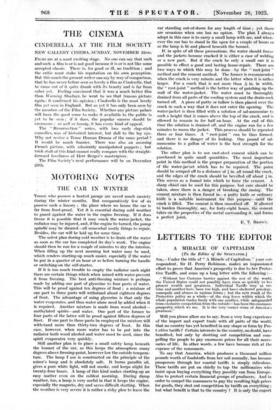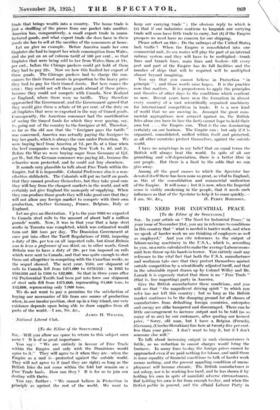LETTERS TO. THE -EDITOR
A- MIRACLE- -OF- :CAPITALISM - . [To the Editor or the' SrEcrxrcin.] . . • . ''Sm,-1.3nder the title of " A Miracle of Capitalism cor- respondent; Sir H. Perry Robinson, makes an impassioned effort to prove that Americit'aprosperitY is due to her -protec-
tive Tariffs, and sums up a long letter with the following :—
." Without her Customs barrier against the rest of -the world, the United States could .not possibly- havOrisen_ so 'quickly to her present wealth and -greatness.-' Individual 'Tariffs' May at one time and another have been too high, and have-sheltered privilege, monopoly and abuses in various_forrat ; - but the. nett result of the Protective policy as a whole—of the ring fence within which .the whole Pophlation trades freely With ohe another, While safeguarded from excessive competition from the ohisidehas been'the enormous prosperity-which we see. It is the very corner Stone of America's greatness: '
Will you please allow me to say, from a very long experience of the import and export trade with all parts of the world, that no country hasytt benefited in any shape or fOrm by Pro- tzctive tariffs? Certain interests in the country, no doubt; haYe benefited, but only by shutting out competition and com- pelling the people' to pay enormous prices for all their neces- saries of life. In other words, a few have become rich at the expense of the consumers.
:TO ,say- that. America, which produces a thousand million
pounds worth of foodstuffs from her soil annually, has become prosperous through. her coastal tariffs is simply- ridiculous. These tariffs are put on chiefly to tap the millionaires who insist upon buying everything they possibly can from Europe.
Also to protect certain financial groups of producers. And in order to compel the consumers to pay the resulting high prices for goods, they shut out competition by tariffs on everything ;
but what benefit is that to the country ? It is only the export
trade that brings wealth into a country. The home trade is jiist a Shuffling of the pieces from one pocket into another. America has, comparatively, a small export trade in rnanu- factured.goods., and what export trade she does have in these (roods she has to sell at the sacrifice of the consumers at home.
Let me give an example. Before America made her own tinplates she had to import her whole consumption from Wales, and she put. on an ad valorem tariff of 100 Per cent., so that tinplates that were being sold to her from Wales, then, at lls, per cwt., before the Chicago packers could get hold of them they had to pay 22s. Now see how this limited her export of these. goods.. The Ghicago packers had to charge the con- salvers for their tinned meats in proportion to the heavy price they had to pay for their tinned sheets. But here comes the eruX : they could not sell these goods abroad at these prices, beeause they could not compete with Canada, New Zealand or England, where there were no tariffs. They -therefore :IpProached the Government, and the Government agreed that they would give them a rebate of 90 per cent. of the duty on afitinplates that were re-exported in the way of tinned goods. Consequently, the American consumer had the mortification of seeing the tinned foods for which they were paying, say, ls. going out of the country to the foreigner at 9d. Therefore, so far as the old saw that the " foreigner pays the tariffs " was concerned; America was actually paying the foreigner to buy her good.S,,which is always the ease under Protection. We were buying beef from America at 7d. per lb. at a time when the beef companies were charging New York ls. 6d. and 2s, Before the War we were buying sugar from Germany at lid. per lb., but the German consumer was paying 5d., because the refineries were protected, and he could not buy elsewhere.
It sounds very plausible to talk about Free Trade within the Empire, but it is impossible. Colonial Preference also is a non- effective shibboleth. The Colonials will put no tariff on goods that they cannot produce themselves, but they take good care they Will buy from-the cheapest markets in the world, and will certainly not give England thamonopoly of supplying. When they can produce those goods they will take good care that they *ill not allow any foreign .nuisket to compete with their own production, whether Germany, France, Belgium, Italy or England, Let me give an illustration. Up to the year 1903 we exported to Canada steel rails to the amount of about half a million pounds' worth. Now, it was in that year that a large steel works in Toronto was completed, which was estimated would turn out 500 .tons per day. The Dominion Government at office put into effect the Tariff Regulations of 1902, imposing a duty of 30s. per ton on all imported rails, but Great Britain was to have-a preference of one- third, or, in other words, Great Britain was to have a duty of 20s. per ton imposed on rails which-were sent to Canada, and that was quite enough to shut them out altogether in competing with the Canadian works, as the sequel showed. The nekt year, 1904, our shipment of rails to Canada fell from £471,000 to 1170,900 in 1905 to £160,000 and in 1906 to £42,000. SO that in three years after the' Preferential Tariffs had been put into force our shipment of steel rails fell from £471,000, representing 84,000 tons, to 142;000, representing- only 7,000 tons.
We do not want to pay- a premium for the satisfaction of buying our necessaries: of life from one source of production when,.in our insular position, shut up in a tiny island, our very existence depends upon being able. to draw supplies 'from all parts of the world.—I am, Sir, &e., JAMES H. WEAGER.
National Liberal Club.























































 Previous page
Previous page